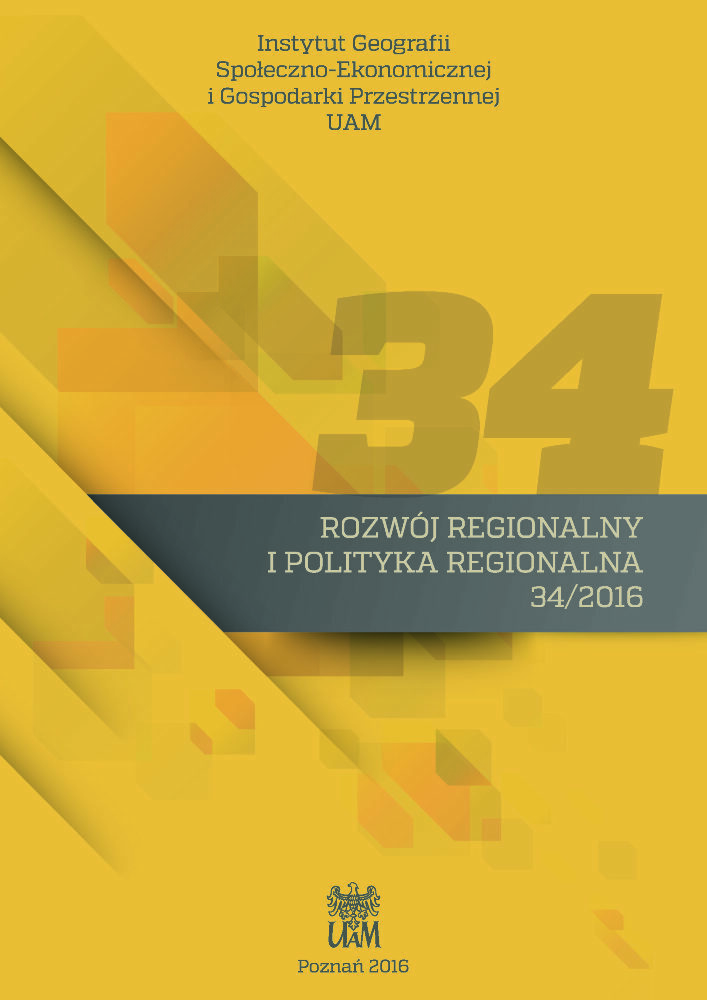Abstrakt
Potrzeba zapewnienia odporności wynika z istniejących oraz powstających zagrożeń naturalnych i antropogenicznych. Dzięki odporności miasto jest przygotowane na niebezpieczeństwa i może dostosować się do nowych warunków. W artykule podjęto próbę stworzenia schematu budowy miasta odpornego oraz sprawdzono jego funkcjonowanie w praktyce. Za studium przypadku wybrano Rotterdam, lidera w budowaniu odporności na zagrożenia związane ze zmianami klimatycznymi. Przeanalizowano dyskurs miasta odpornego w dokumentach lokalnych oraz praktyczne wdrażanie koncepcji. Wykazano, że budowanie odporności jest złożonym procesem. Rozpoczyna się poprzez współpracę podmiotów, prowadzącą do budowy silnej struktury umożliwiającej przepływ wiedzy, informacji i innowacji. W efekcie powstają projekty, których realizacja może zapewnić miastu długoterminową odporność.Bibliografia
Aarts M., Daamen T., Huijs M., de Vries W. bd. Port-city development in Rotterdam: a true love story (http://urban-e.aq.upm.es/pdf/PortCityDevelopment_ATrueLoveStory.pdf; dostęp: 12.12.2014).
Ahern J., Cilliers S., Niemela J. 2014. The concept of ecosystem services in adaptive urban planning and design: A framework for supporting innovation. Landscape and Urban Planning, 125: 254–259. DOI: https://doi.org/10.1016/j.landurbplan.2014.01.020
Boer F. 2014. Benthemplein: an exciting combination of greenery, recreation and water storage. DELTA Rotterdam. Connecting water with opportunities, s. 8–10.
Borucka A., Pisarska A. 2012. Koncepcja resilience – czyli jak pomóc dzieciom i młodzieży z grup podwyższonego ryzyka. Ośrodek Rozwoju Edukacji (http://ore.edu.pl/index.php?option=com_phocadownload&view=category&id=126:podstawy-profilaktyki&Itemid=1148#; dostęp: 15.10. 2014).
CDC. 2013. Resilient cities and climate adaptation strategies (http://www.rotterdamclimateinitiative.nl/documents/Documenten/CDC_volume_3_Resilient_Cities_and_Climate_Adaptation_Strategies.pdf; dostęp: 12.12.2014).
CDP. 2013a. CDP Cities 2013 information request. Gemeente Rotterdam (https://www.cdp.net/en-US/Results/Pages/Company-Responses.aspx?company=31179; dostęp: 10.10.2014).
CDP. 2013b. CDP Cities 2013. Summary report on 110 global cities (http://www.cdpcities2013.net/doc/CDP-Summary-Report.pdf; dostęp 1.11.2014).
de Graaf R., van der Brugge R. 2010. Transforming water infrastructure by linking water management and urban renewal in Rotterdam. Technological Forecasting & Social Change, 77: 1282–1291. DOI: https://doi.org/10.1016/j.techfore.2010.03.011
Desouza K.C., Flanery T.H. 2013. Designing, plannning, and managing resilient cities: A conceptual framework. Cities, 35: 89–99. DOI: https://doi.org/10.1016/j.cities.2013.06.003
Dieleman H. 2013. Organizational learning for resilient cities, through realizing eco-cultural innovations. Journal of Cleaner Production, 50: 171–180. DOI: https://doi.org/10.1016/j.jclepro.2012.11.027
Dircke P., Moleneer A., Aerts J., 2012. Climate adaptation and flood management in the city of Rotterdam. [W:] J. Aerts, W. Botzen, M.J. Bowman, P.J. Ward, P. Dircke (red.), Climate adaptation and flood risk in coastal cities. Earthscan, Nowy Jork, s. 305–320.
Eraydin A., Tasan-Kok T. 2013. Resilience thinking in urban planning. Springer, Dordrecht, Heidelberg, New York, London. DOI: https://doi.org/10.1007/978-94-007-5476-8
Fiksel J. 2006. Sustainability and resilience: toward a systems approach. Sustainability: Science, Practice & Policy, 2, 2: 14–21. DOI: https://doi.org/10.1080/15487733.2006.11907980
Frantzeskaki N., Wittmayer J., Loorbach D. 2014. The role of partnership in ‘realising’ urban sustainability in Rotterdam’s City Ports Area, the Netherlands. Journal of Cleaner Production, 65: 406–417. DOI: https://doi.org/10.1016/j.jclepro.2013.09.023
Fundacja Sendzimira. 2014. Zrównoważony rozwój – zastosowania. Woda w mieście. Fundacja Sendzimira, Kraków.
Grosvenor, 2014. Resilient cities. A Grosvenor research report (http://www.grosvenor.com/getattachment/194bb2f9-d778-4701-a0ed-5cb451044ab1/ResilientCitiesResearchReport.pdf; dostęp: 1.11.2014).
Holling C.S. 1973. Resilience and stability of ecological systems. Annual Review of Ecology and Systematics, 4: 1–23. DOI: https://doi.org/10.1146/annurev.es.04.110173.000245
Hussain M., 2013. Resilience: meaningless jargon or development solution? (http://www.theguardian.com/global-development-professionals-network/2013/mar/05/resilience-development-buzzwords; dostęp: 24.10.2014).
ICLEI Resilient Cities, b.d. Glossary of key terms (http://resilient-cities.iclei.org/resilient-cities-hub-site/resilience-resource-point/glossary-of-key-terms/; dostęp: 1.11.2014).
Jabareen Y. 2013. Planning the resilient city: concepts and strategies for coping with climate change and environmental risk. Cities, 31: 220–229. DOI: https://doi.org/10.1016/j.cities.2012.05.004
Klein R.J.T., Nicholls R.J., Thomalla F. 2003. Resilience to natural hazards: how useful is this concept? Global Environmental Change Part B: Environmental Hazards, 5, 1–2: 35–45. DOI: https://doi.org/10.1016/S1464-2867(04)00010-5
Lansen A.J., Jonkman S.N. 2012. Vulnerability of port infrastructure for the Port of Rotterdam. [W:] J. Aerts, W. Botzen, M.J. Bowman, P.J. Ward, P. Dircke (red.), Climate adaptation and flood risk in coastal cities. Earthscan, New York, s. 53–73.
Lu P., Stead D. 2013. Understanding the notion of resilience in spatial planning: A case study of Rotterdam, The Netherlands. Cities, 35: 200–212. DOI: https://doi.org/10.1016/j.cities.2013.06.001
Merk O., Notteboom T., 2013. The competitiveness of global port-cities: the case of Rotterdam/Amsterdam – the Netherlands. OECD Regional Development Working Papers, OECD Publishing (www.oecd.org/regional/portcities; dostęp: 2.12.2014).
Meyer H., Nillesen A. L., Zonneveld W. 2012. Rotterdam: a city and a mainport on the edge of a delta. European Planning Studies, 20, 1: 71–94. DOI: https://doi.org/10.1080/09654313.2011.638498
ONZ. 2014. World urbanization prospects. ONZ, New York.
Pisano U. 2012. Resilience and sustainable development: theory of resilience, systems thinking and adaptive governance. ESDN Quarterly Report 26 (http://www.sd-network.eu/quarterly%20reports/report%20files/pdf/2012-September-Resilience_and_Sustainable_Development.pdf; dostęp: 15.10.2014).
Port of Rotterdam, bd. CO2 footprint Port of Rotterdam Authority (http://www.portofrotterdam.com/en/Port/port-in-general/Documents/201309ID-FS016-CO2%20FOOTPRINT-E.PDF; dostęp: 12.12.2014).
Prasad N., Ranghieri F., Shah F., Trohanis Z., Kessler E., Sinha R. 2009. Climate resilient cities. A primer on reducing vulnerabilities to disasters. The World Bank, Washington, D.C. DOI: https://doi.org/10.1596/978-0-8213-7766-6
RCI. 2014. Rotterdam & flood management unembanked areas – by Peter van Veelen (https://www.youtube.com/watch?v=lviZpuoCTW8; dostęp: 1.12.2014).
Slater T. 2014. The resilience of neoliberal urbanism (https://www.opendemocracy.net/opensecurity/tom-slater/resilience-of-neoliberal-urbanism; dostęp: 24.10.2014).
Stead D. 2014. Urban planning, water management and climate change strategies: adaptation, mitigation and resilience narratives in the Netherlands. International Journal of Sustainable Development & World Ecology, 21, 1: 15–27. DOI: https://doi.org/10.1080/13504509.2013.824928
Stead D., Taşan-Kok T. 2013. Urban resilience, climate change and land-use planning in Rotterdam. [W:] A. Eraydin, T. Taşan-Kok (red.), Resilience Thinking in Urban Planning. Springer. Dordrecht, Heidelberg, New York, London, s. 211–228. DOI: https://doi.org/10.1007/978-94-007-5476-8_13
Stumpp E.M. 2013. New in town? On resilience and “resilient cities”. Cities, 32: 164–166. DOI: https://doi.org/10.1016/j.cities.2013.01.003
Urbanisten. 2014. Watersquare Benthemplein (http://www.urbanisten.nl/wp/?portfolio=waterplein-benthemplein; dostęp: 12.12.2014).
Vale L.J. 2014. The politics of resilient cities: whose resilience and whose city? Building Research & Information, 42, 2: 191–201. DOI: https://doi.org/10.1080/09613218.2014.850602
Licencja
Copyright
© 2016 IGSEiGP, Uniwersytet im. Adama Mickiewicza w Poznaniu
OPEN ACCESS
